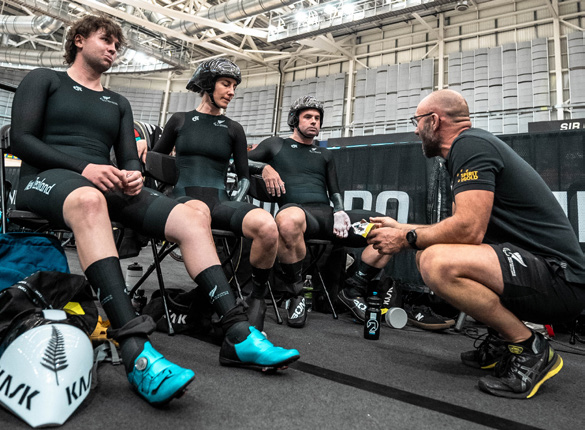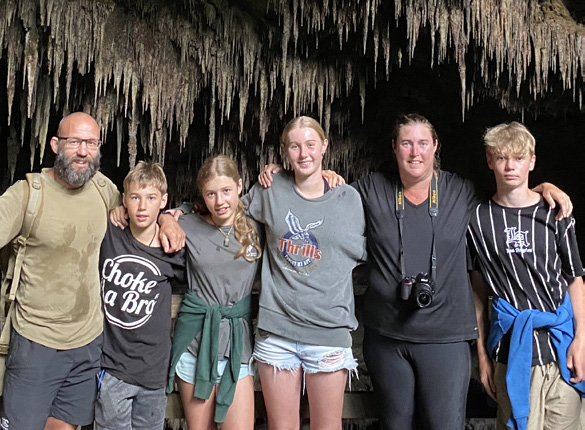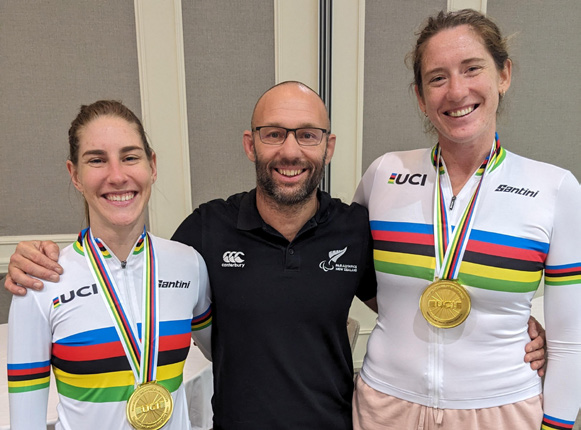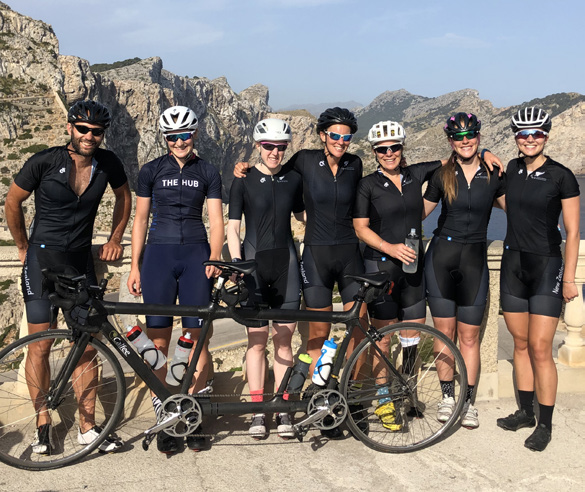Damian Wiseman
Damian Wiseman
- Coach Profile
Para Cycling Performance Coach and Lead Sports Scientist
Armed with a lengthy list of educational qualifications, a creative streak, and the ability to think outside the square, Damian Wiseman has tailored a multi-layered jack-of-all-trades approach to his success as an elite-level cycling coach.
Combined with a love of competing, the former New Zealand track cyclist also has a natural affinity for helping people, which started when he was at school. In the interim, he has gone on to coach many athletes across a variety of sports over the past 30 years.
In more recent times, he has left his mark in cycling, working with both able-bodied and para cyclists at the elite level.
“There’s quite an enjoyment around teaching people things, helping people to learn new things and helping other people to get better at something they’re doing, other than troubleshooting when it may not be working right,” Wiseman said.
“It always felt comfortable. It just started with helping mates with their training when I was at school, other guys that I rode with, even bringing multiple layers to that, helping them with their bikes, their training and their approach to training is a big memory going back to the early to mid- 1990s.”
Wanting his own coach when he was racing to fill gaps in his knowledge and understanding, Wiseman was advised by others he didn’t need one, which he looks back on with regret.
“I’m really disappointed that I listened to those guys because knowing the way that I operate and knowing what
I was looking for guidance and mentoring back then, and some help in that space would have really helped me when I was riding my bike and would possibly have accelerated my own understanding and potential transition into the value I was able to give other people with the things that I knew,” he said.

“What it did feed into is probably my natural problem-solving lens that I take on in relation to anything and everything I do. I quite like to take it outside of the box and step away from some of the traditional things that might be done within a sport and have a look at how we might resolve this problem in the best way possible rather than just doing the things that you would normally do in that sport or activity.”
“It’s the one thing I’ve looked for as I’ve gotten older, and I have an enormous amount of value for it. It is someone who can guide me through parts of the learning process. I can bring value into that space with my own experience and understanding, but having someone who can have a broader view and help guide me through that is refreshing for me, given that I didn’t have it when I was younger.”
“It validates a perspective on coaching, what a coach is, and the value that that person brings.”

Wiseman credits his gravitation into the high-performance arena to a series of good decisions and good fortune, which began in the early 2000s when he began working with young athletes while still training and racing himself.
After leaving the University of Otago with a Bachelor of Physical Education, a Bachelor of Science, a Postgraduate Diploma in Sports Medicine and a Master of Physical Education, Wiseman and his wife owned and ran a small gym in Auckland, which provided a vehicle for strength and conditioning work and coaching.
Combined with his academic background, it had a flow-on effect, and he was subsequently invited to participate in a variety of coaching opportunities with Bike NZ (now Cycling New Zealand).
“It got to the point where their Director of High Performance said, ‘You can’t do everything; you’re going to have to make a decision on what you do’. There were three doors – a performance science, strength and conditioning or coaching path that I could go down,” Wiseman said.
Around 2011, he made the call to undertake a PhD, do more study and go down the performance science pathway with the developing sprint programme at the time.
There hadn’t been a sprint programme before, and the success of some of the junior riders who had come through laid the foundations for it, and Wiseman fell into that space.
“My PhD research was based on questions we were looking to answer with those athletes and performance that we were looking to improve,” he said. “So, for me, I took the academic option with the intention that it was going to enhance my ability to be a better coach with more understanding and more growth.”
Wiseman removed himself from the gym business and moved into a performance science/sports science physiology role with the sprint programme while working on his doctoral research, which essentially embargoed research at the time on the athletes in that programme.
Following the Brisbane Commonwealth Games in 2018, Wiseman left his position with Cycling NZ and started working with Paralympics NZ and its para-cycling programme.

“With all of my hats on at the same time, sports science is an enormously valuable field that can provide a lot to the sport, to the athletes and to the coach, as long as the coach knows what they want and how they’re going to use that information,” he said.
“The successful approaches that I’ve seen have been where there’s a good understanding from the coach at real collaborative engagement around what that provider is able to contribute. That really does feed a lot of how I operate.”
“I want the information; I need it. I’m quite keen to get alternative perspectives and interpretations of the information that’s coming through. I’m also really keen to sit and collaborate with the performance analysts, other coaches, and other people. I value their perspective, and I can rely on the information that they’re going to be able to provide to guide my thinking as well.”
“Any situation where you’ve got multiple people engaged around a team, as long as you’ve got a really good group of people who have a lot of respect and a lot of collaborative engagement, things will work really well. And that feeds into my underlying coaching philosophy which has become more apparent in the last four or five years. Relationships sit at the centre of everything.”
“It’s the same with athletes… you build good, strong, quality relationships with the athletes, then you don’t have to worry about anything else. Things that need to be done get done because everybody knows that they’re cared for, that they are getting looked after, and they don’t have to worry”
“That sits at the core of how I operate and that the value comes from good connections with people. And that’s my coaching philosophy…..you have good, strong, trusting, caring relationships.”
Introduced to track cycling in the mid-1990s and then road racing provided an environment for Wiseman to express his competitive side. But he was knocked completely off stride when diagnosed with Type 1 diabetes in early 2000.
Thinking that would change his cycling ambitions into one of a more recreational pursuit proved way off the mark.
“I couldn’t have been more wrong,” he said. “I started to understand that there are no barriers, and I got back on my bike towards the end of that year.”
“Dunedin had just built a new velodrome in Mosgiel, so I took my track bike back to Dunedin with me, went out to the velodrome, and so began the next 10 years of my life where I all I did was track sprinting, which I just loved and had a lot of fun and enjoyment.”
“It also gave me a vehicle for exploring the limits of my diabetes which I was helping, or proving, that there were none. It also fine-tuned a direction that I was going to take for the next….we’re up to about 25 years now….of cycling and track cycling and where I’ve gone since I stopped racing.”
Wiseman stopped racing when his second child was on the way in 2009.
He also represented New Zealand during that time, but he spent more and more time in the coaching field.
With his most recent venture involving paracyclists and experiencing great success with his athletes at the recent UCI Para Track Cycling World Champs in Rio de Janeiro, Wiseman has found a niche that is tailor-made for his skillset.

His coaching philosophy essentially remains the same, but he has found real value in having a problem-solving, trouble-shooting perspective on things where an out-of-the-box and consultative lens plays key roles.
“You’ve got athletes with varying degrees of muscle function or impairment that you’re trying to resolve appropriate training so that they can adapt and improve performance,” he said.
“And with other athletes who may be missing a limb or a part of a limb, you need to try and find a way to accommodate what they can do and enhance what they can do.
“There are so many layers to para-cycling and to the athletes that I’m working with that makes it all quite unique and individual in that area as well, so we’ll spend time working on different adaptations to secure athletes to their bike so they can deliver more of the physical qualities that they’ve got as well as looking for things that we can challenge them with physically and physiologically to improve their adaptation to the training that they will do.”
“The philosophy is the same. Training is just about being able to do harder things for longer, and that’s where we’re going with everything that we’re doing able-bodied, disabled or para-athletes.”
“You’re trying to create an ability for them to go harder for longer more often and the athletes that you can see progressing in their performances, that’s been the thing that’s driven them.”
“In that para space, you just get some different things that you have to deal with, which is pretty cool. My brain does operate quite creatively in that space, and I’ve had times when I’ll be out in the shed at home in the evening making something that we can try at training the next day or that we’ll use as a prototype for an adaptation.”
“It’s a lot of fun. There’s always a lot of discussion between coaches around enjoyment and reward, and operating in this space, for me, there’s an enormous amount of that.”
Wiseman has taken plenty from the many he has interacted with over the years and credits former Cycling NZ sprint coach Rene Wolff, a former German Olympic and world champion track cyclist, former Programme Manager with Para Cycling Marty Croy, and friend and former Cycling NZ colleague Craig Palmer, now High-Performance Sport NZ’s Core Knowledge programme lead, as major influences in helping shape his career.
“I sit in that camp of being a big believer that we stand on the shoulders of giants, so where I am, where I’ve got to and how I’ve got there is a direct influence of all of the people that I’ve interacted with and operated within that space,” he said.